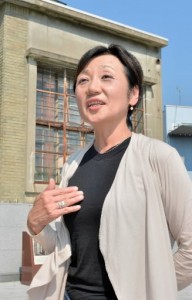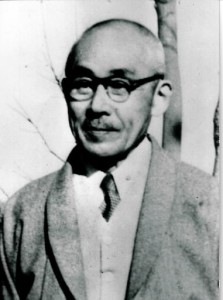Granddaughter of former director of Hiroshima Red Cross Hospital stresses inhumanity of nuclear weapons in U.S.
Aug. 24, 2015
by Michiko Tanaka, Staff Writer
Michi Takeuchi, 59, who was raised in Minami Ward, Hiroshima and now lives in New York, is speaking out about the inhumanity of nuclear weapons in the United States, the nuclear superpower which dropped the atomic bomb on the city of Hiroshima. Ms. Takeuchi’s grandfather, the late Ken Takeuchi, was the director of the Hiroshima Red Cross Hospital (today’s Hiroshima Red Cross Hospital & Atomic-bomb Survivors’ Hospital in Naka Ward) on the day of the atomic bombing. “I want to believe that steady appeals will make a difference,” Ms. Takeuchi said. On August 5, the day prior to the 70th anniversary of the atomic bombing, she visited Hiroshima, where her grandfather had struggled to respond to the catastrophe, and resolved to hand down his experience to others.
Looking at the monument to the former hospital building, which is the only reminder of the hospital at that time, Ms. Takeuchi said, “I heard that my grandfather, despite his own serious injuries, gave instructions on how to treat the wounded. I believe he was driven by a sense of duty.”
Ken Takeuchi grew up in the town of Yanagawa (now the city of Yanagawa) in Fukuoka Prefecture. After graduating from the Tokyo Imperial University, he worked as a military surgeon, then, in 1939, was assigned to serve as the first director of the Hiroshima branch hospital of the former Japanese Red Cross Society. On August 6, 1945, he experienced the atomic bombing at this site, reportedly suffering eight broken bones. Until he opened his own hospital in Minami Ward in 1949, he devoted himself to efforts to restore the A-bombed facility. He died in 1974 at the age of 84.
During his life, Mr. Takeuchi never spoke about his experience of the bombing. Though Ms. Takeuchi’s mother was also exposed to the bomb’s radiation after entering the city after the blast, she said, “I had never considered myself a second-generation A-bomb survivor.” After graduating from Hiroshima Jogakuin Senior High School, located in Naka Ward, she went abroad to study in the United States. She then established a company to lend support to Japanese firms seeking to expand overseas in the U.S. market and has been living there for about 40 years. “Americans don’t even talk about nuclear weapons because they take nuclear weapons for granted. To be honest, I was also influenced by this sort of environment,” she said.
Her thinking, though, changed five years ago when she was asked to be an interpreter for an A-bomb survivor who was sharing a personal account of the bombing with high school students in the United States. She then began to help the American antinuclear group called “Hibakusha Stories,” which planned that activity, and came to recognize the real danger of nuclear arms. Asked to speak as a second-generation survivor, she felt hesitant, but decided to trace her grandfather’s experience.
In August 1946, the year after the atomic bombing, her grandfather wrote an article in the “Monthly Magazine Chugoku,” which was published by the Chugoku Shimbun. In this article, he stressed the serious effects of the atomic bombing to the human body. At the end of the piece, he included a haiku poem that he wrote: Summer grass / Standing in the ruins / It’s hard to leave. The haiku impressed her. “I could understand why, although he wasn’t a native of the city, he chose to stay in Hiroshima. I think he wanted to give continuous support to Hiroshima in some way,” she said.
This past April and May, Ms. Takeuchi shared her grandfather’s story at schools in New York. She was sometimes encouraged by the enthusiastic eyes of the students. But on one occasion her words were rebuffed with the curt comment that “abolishing nuclear weapons is an unrealistic idea.” She said, “If a nuclear explosion occurs, anyone could become a victim. I will keep on emphasizing to others that this is not a matter of someone else suffering.” She has come back to her hometown, with members of the Hibakusha Stories. On August 6, they will visit Hiroshima Jogakuin Junior and Senior High School as a group to convey her message to students at her alma mater.
(Originally published on August 6, 2015)
Michi Takeuchi, 59, who was raised in Minami Ward, Hiroshima and now lives in New York, is speaking out about the inhumanity of nuclear weapons in the United States, the nuclear superpower which dropped the atomic bomb on the city of Hiroshima. Ms. Takeuchi’s grandfather, the late Ken Takeuchi, was the director of the Hiroshima Red Cross Hospital (today’s Hiroshima Red Cross Hospital & Atomic-bomb Survivors’ Hospital in Naka Ward) on the day of the atomic bombing. “I want to believe that steady appeals will make a difference,” Ms. Takeuchi said. On August 5, the day prior to the 70th anniversary of the atomic bombing, she visited Hiroshima, where her grandfather had struggled to respond to the catastrophe, and resolved to hand down his experience to others.
Looking at the monument to the former hospital building, which is the only reminder of the hospital at that time, Ms. Takeuchi said, “I heard that my grandfather, despite his own serious injuries, gave instructions on how to treat the wounded. I believe he was driven by a sense of duty.”
Ken Takeuchi grew up in the town of Yanagawa (now the city of Yanagawa) in Fukuoka Prefecture. After graduating from the Tokyo Imperial University, he worked as a military surgeon, then, in 1939, was assigned to serve as the first director of the Hiroshima branch hospital of the former Japanese Red Cross Society. On August 6, 1945, he experienced the atomic bombing at this site, reportedly suffering eight broken bones. Until he opened his own hospital in Minami Ward in 1949, he devoted himself to efforts to restore the A-bombed facility. He died in 1974 at the age of 84.
During his life, Mr. Takeuchi never spoke about his experience of the bombing. Though Ms. Takeuchi’s mother was also exposed to the bomb’s radiation after entering the city after the blast, she said, “I had never considered myself a second-generation A-bomb survivor.” After graduating from Hiroshima Jogakuin Senior High School, located in Naka Ward, she went abroad to study in the United States. She then established a company to lend support to Japanese firms seeking to expand overseas in the U.S. market and has been living there for about 40 years. “Americans don’t even talk about nuclear weapons because they take nuclear weapons for granted. To be honest, I was also influenced by this sort of environment,” she said.
Her thinking, though, changed five years ago when she was asked to be an interpreter for an A-bomb survivor who was sharing a personal account of the bombing with high school students in the United States. She then began to help the American antinuclear group called “Hibakusha Stories,” which planned that activity, and came to recognize the real danger of nuclear arms. Asked to speak as a second-generation survivor, she felt hesitant, but decided to trace her grandfather’s experience.
In August 1946, the year after the atomic bombing, her grandfather wrote an article in the “Monthly Magazine Chugoku,” which was published by the Chugoku Shimbun. In this article, he stressed the serious effects of the atomic bombing to the human body. At the end of the piece, he included a haiku poem that he wrote: Summer grass / Standing in the ruins / It’s hard to leave. The haiku impressed her. “I could understand why, although he wasn’t a native of the city, he chose to stay in Hiroshima. I think he wanted to give continuous support to Hiroshima in some way,” she said.
This past April and May, Ms. Takeuchi shared her grandfather’s story at schools in New York. She was sometimes encouraged by the enthusiastic eyes of the students. But on one occasion her words were rebuffed with the curt comment that “abolishing nuclear weapons is an unrealistic idea.” She said, “If a nuclear explosion occurs, anyone could become a victim. I will keep on emphasizing to others that this is not a matter of someone else suffering.” She has come back to her hometown, with members of the Hibakusha Stories. On August 6, they will visit Hiroshima Jogakuin Junior and Senior High School as a group to convey her message to students at her alma mater.
(Originally published on August 6, 2015)








